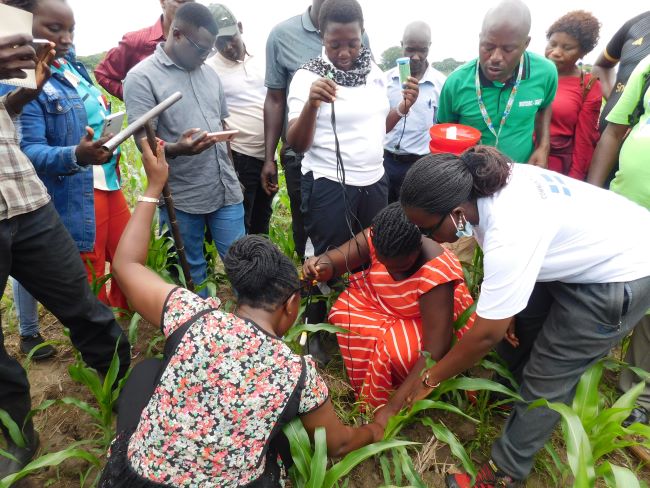KASESE, October 31, 2024 — Farmers in Kasese are reaping the benefits of climate-smart technology designed to mitigate the impacts of climate change, boost agricultural productivity, and enhance overall efficiency.
The Association for Strengthening Agricultural Research in Eastern and Central Africa [ASARECA], through its Accelerating Impacts of CGIAR Climate Research for Africa [AICCRA] project, is facilitating access to moisture and nutrient monitoring tools for smallholder farmers in Kasese district. This initiative aims to improve agricultural outcomes while reducing production costs.
The introduced technology enables farmers to optimise water use, thereby minimising wastage and potential conflicts over water resources in irrigation schemes. Key tools include:
- Chameleon Sensor Array: Measures soil moisture at various depths.
- Nitrogen Strips: Assesses fertiliSer runoff.
- Wetting Front Detector: Determines optimal irrigation cessation and measures water salinity to guide crop selection.
Initially piloted in the Mubuku Irrigation Settlement Scheme, this innovative approach is expected to provide crucial support to the agricultural sector amidst the challenges posed by climate change.
Dr. Joshua Oponya, Programme Officer at ASARECA, emphasised that effective irrigation allows millions of smallholder farmers to intensively cultivate their land, enhancing income and resilience against climate-related risks. However, he acknowledged that challenges such as water scarcity, high irrigation equipment costs, and limited technical knowledge hinder widespread adoption in Eastern and Central Africa.
“There are opportunities to enhance irrigation practices through capacity building and the implementation of climate-resilient irrigation systems. Utilising moisture and nutrient monitoring tools is one such system being promoted across Africa,” Oponya stated.
ASARECA is expanding the use of these monitoring tools in Uganda, which were previously tested in Tanzania and Malawi under the Virtual Irrigation Academy [VIA] project. Dr. Isaac Fandika, Chief Agricultural Research Scientist in Irrigation and Drainage from Malawi, noted that these tools are both climate-smart and user-friendly, allowing farmers to manage water resources efficiently and adapt to climate change.

Julius Baluku, Kasese District Production Officer, highlighted that the technology will empower farmers to make informed decisions in light of high water demand for production, which has historically led to access challenges and conflicts. He underscored the potential for increased productivity and improved livelihoods through more efficient water usage.
Farmer Jemimah Kyakimwa, involved in a micro-irrigation scheme, expressed optimism about the technology’s arrival, stating it would help minimise losses associated with irrigation and fertiliser application. “We struggled with climate change impacts, especially drought, and lacked guidance on when to irrigate. This often led to over-irrigation, washing away vital nutrients,” she explained. Kyakimwa added that the new technology will assist in proper fertilizer application and crop selection, ultimately enhancing yields.
Yusta Kamwaka, another farmer in the Mubuku Irrigation Scheme, is hopeful that the technology will resolve ongoing water conflicts. “We previously used excessive water for irrigation without understanding our crops’ actual needs, leading to waste that could benefit other farmers,” she noted. Kamwaka believes that effective use of these technologies will boost production and reduce losses.
Currently, over 600 farmers utilise the Mubuku Irrigation Scheme, and more than 120 are involved in micro-irrigation projects. ASARECA, an intergovernmental organisation comprising 15 member states including Uganda, Tanzania, South Sudan, Kenya, and Madagascar, is funded by the World Bank to enhance the technical and institutional capacities needed for transferring climate-relevant information and technologies to farmers across the region.
The project in Mubuku is part of a larger initiative aimed at tackling water and climate-related agricultural challenges, ensuring smallholder farmers are better equipped to sustain their livelihoods. Recently, about 70 farmers, extension workers, and local government officials participated in training on climate-smart moisture and nutrient tools.
According to Julian Barungi, ASARECA’s Programme Officer, the project will soon be expanded to other irrigation schemes in Uganda. Following the training, ASARECA donated 50 tools to participants, including 10 for soil nutrient monitoring and 40 for soil moisture monitoring, enabling them to train more farmers in the district.
Buy your copy of thecooperator magazine from one of our country- wide vending points or an e-copy on emag.thecooperator.news
-
-
-
-
